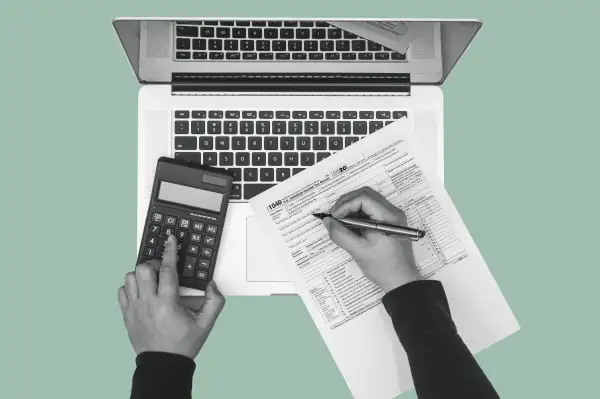What If I Forgot to Do My Taxes? And Other Urgent Tax Day Questions, Answered

Finally… Tax Day is here.
Whether your taxes have been filed for months and you’re relaxing, or you’re scrambling last minute, we can all agree that tax season was wonky this year. The federal tax deadline got pushed back from the usual April 15 for the second year in a row (and not all states followed suit), unemployment benefits threw a wrench in the filing routine for many and stimulus checks caused confusion.
But before we put our 2020 taxes to bed (hopefully) for good, here are last-minute questions about filing your return, answered.
What if I don’t file my taxes?
If you’re owed a refund from the government, you likely won’t face a penalty if you blow the deadline, according to H&R Block. But you also won’t get the money you’re owed until you file. You typically have three years to claim a refund.
If you do owe taxes, you’ll owe fees for not filing and not paying. The IRS charges a failure-to-file penalty, which is 5% of the unpaid taxes for each month or part of a month that a return is late, up to 25% of your unpaid taxes, if you don’t file your return or file for an extension. The fee for paying late is 0.5% of the tax owed after the deadline for each month or part of a month the tax remains unpaid, up to 25%. However, if both fees are applicable in the same month, the combined penalty is 5% for each month or part of a month that your return was late, up to 25%.
If you won’t be able to file your taxes in time, you can get an extension by filing a Form 4868 through your accountant, tax software like TurboTax or via the IRS website, or request an extension when you make a payment to the IRS. But keep in mind that getting more time to file your taxes doesn’t mean you have more time to pay your taxes. If you owe Uncle Sam money and don’t pay the full amount on Tax Day, penalties and interest will begin to accrue on May 18. Make sure to set up a payment plan with the IRS if you can’t pay your full bill.
When you a file a late tax return, you can request to have the penalties reduced or removed if you have reasonable cause.
In short, don’t panic. All is not lost if you file your taxes a bit late, says Jeffrey Wood, CPA and partner with Lift Financial in South Jordan, Utah. “But just get it done as quickly as possible.”
What are my chances of getting audited?
On average, your chances of being audited are extremely low — generally less than 1% for households making $500,000 or less, says Howard Gleckman, a senior fellow at the Urban-Brookings Tax Policy Center. (The IRS audited 0.6% of all individual tax returns filed for tax years 2010 through 2018, and and just 0.4% in 2019.)
Taxpayers who are selected for audits may be picked randomly, but there are also red flags that can increase your chances, like failing to report income, claiming unusually high deductible expenses from a business and simple math errors, Gleckman says. You may get a bill from the IRS or a letter asking for proof of a deduction or other claim made on your return but, even if you’re audited, you likely won’t face a full-blown investigation.
The agency is also under a lot of stress right now; earlier this year, taxpayers couldn’t even get through on the phone. And while audits may increase soon since President Joe Biden has proposed a plan to give the IRS $80 billion to crack down on audits, the focus is on high-earning individuals and corporations. (Already, the likelihood of getting audited increases with your income level, according to the IRS.)
When is the tax deadline if you get an extension?
Tax deadlines are confusing this year. Tax Day was pushed to May 17 from its usual April 15. While that meant taxpayers also had until May 17 to make 2020 contributions to individual retirement accounts (IRAs), Roth IRAs and health savings accounts (HSAs), quarterly filers still owed payments on April 15.
Despite the confusion, a deadline that hasn’t changed is the date by which you have to file your taxes if you get an extension: October 15. So if you file for an extension, you still need to get your taxes done by that date (again, that doesn’t mean you have until then to pay your taxes).
How can I prepare better for next year's taxes?
The last thing you probably want to think about right now are next year’s taxes. But a little planning could mean less scrambling when April 2022 comes around.
“A lot of people don’t know what type of documents they need to keep for tax filing,” says Sallie Mullins Thompson, a CPA at the financial services firm in her name in New York City.
Figure out what documents you’ll need ahead of time now for next year, like utility bills for your home office or letters from charities you donated to. Thompson recommends collecting these documents monthly and keeping them in an electronic or paper filing system so you’re not scrambling come next year’s tax season.
More from Money:
Interest Rates on Federal Student Loans Are Set to Increase This Fall
